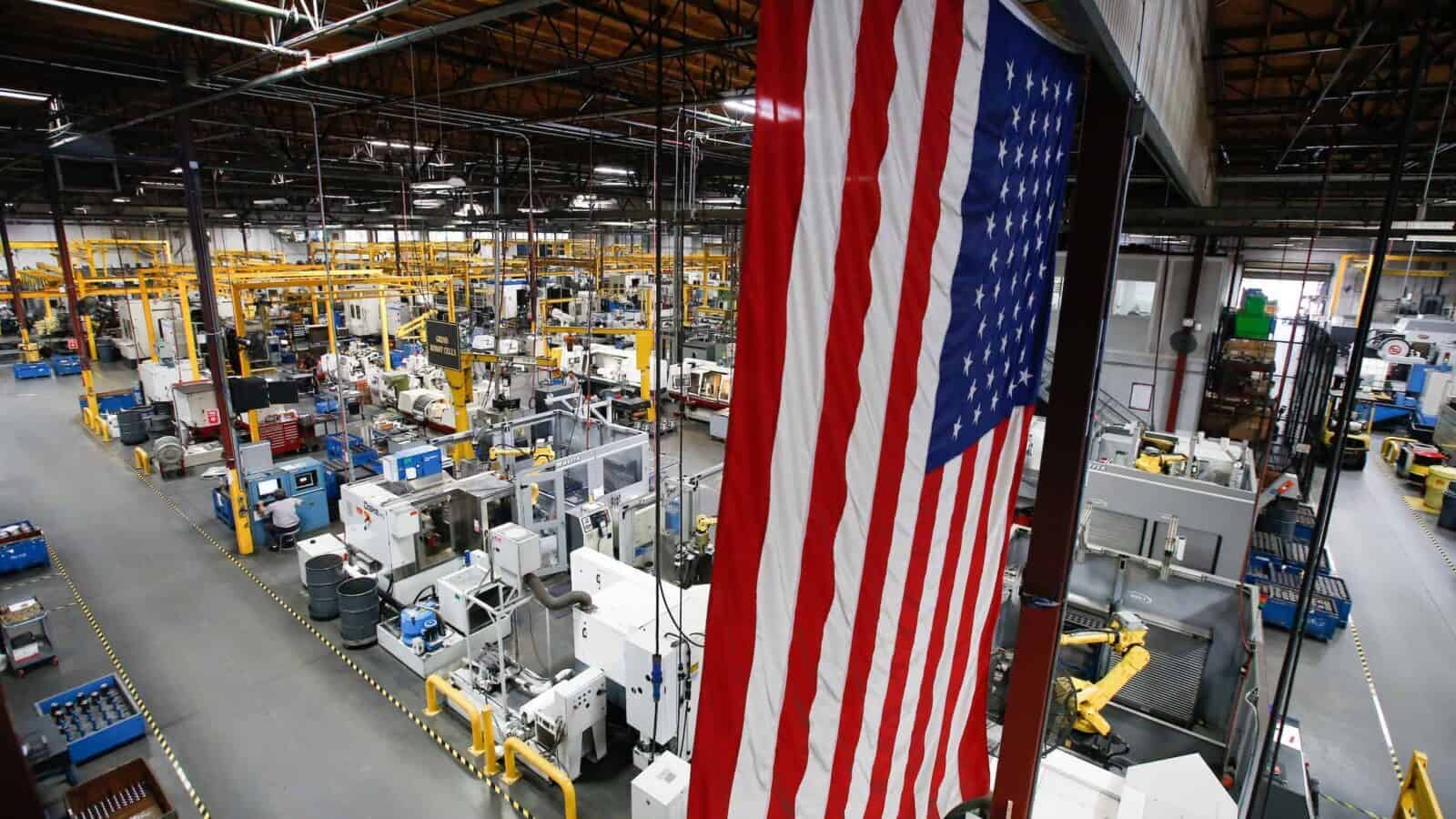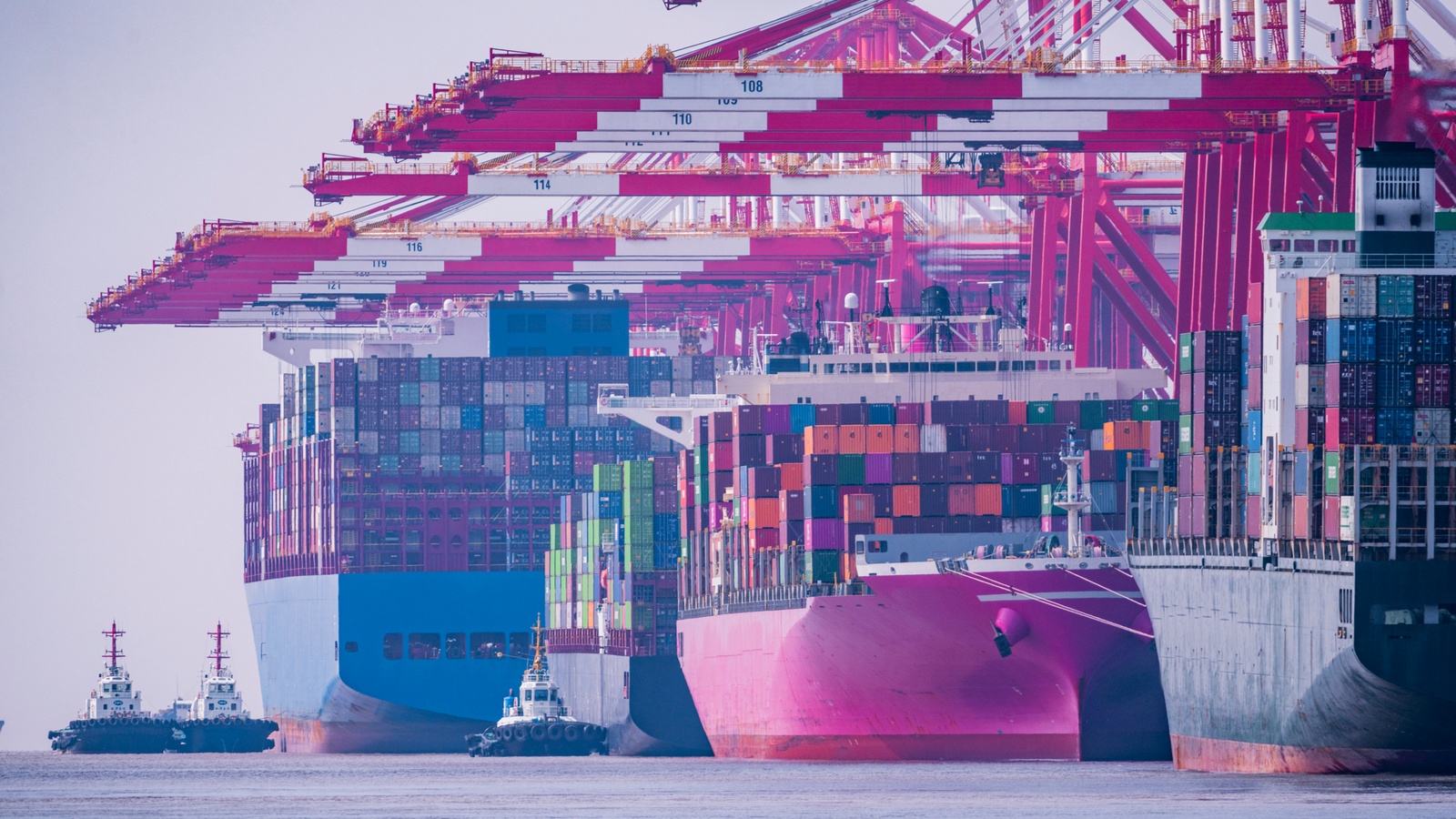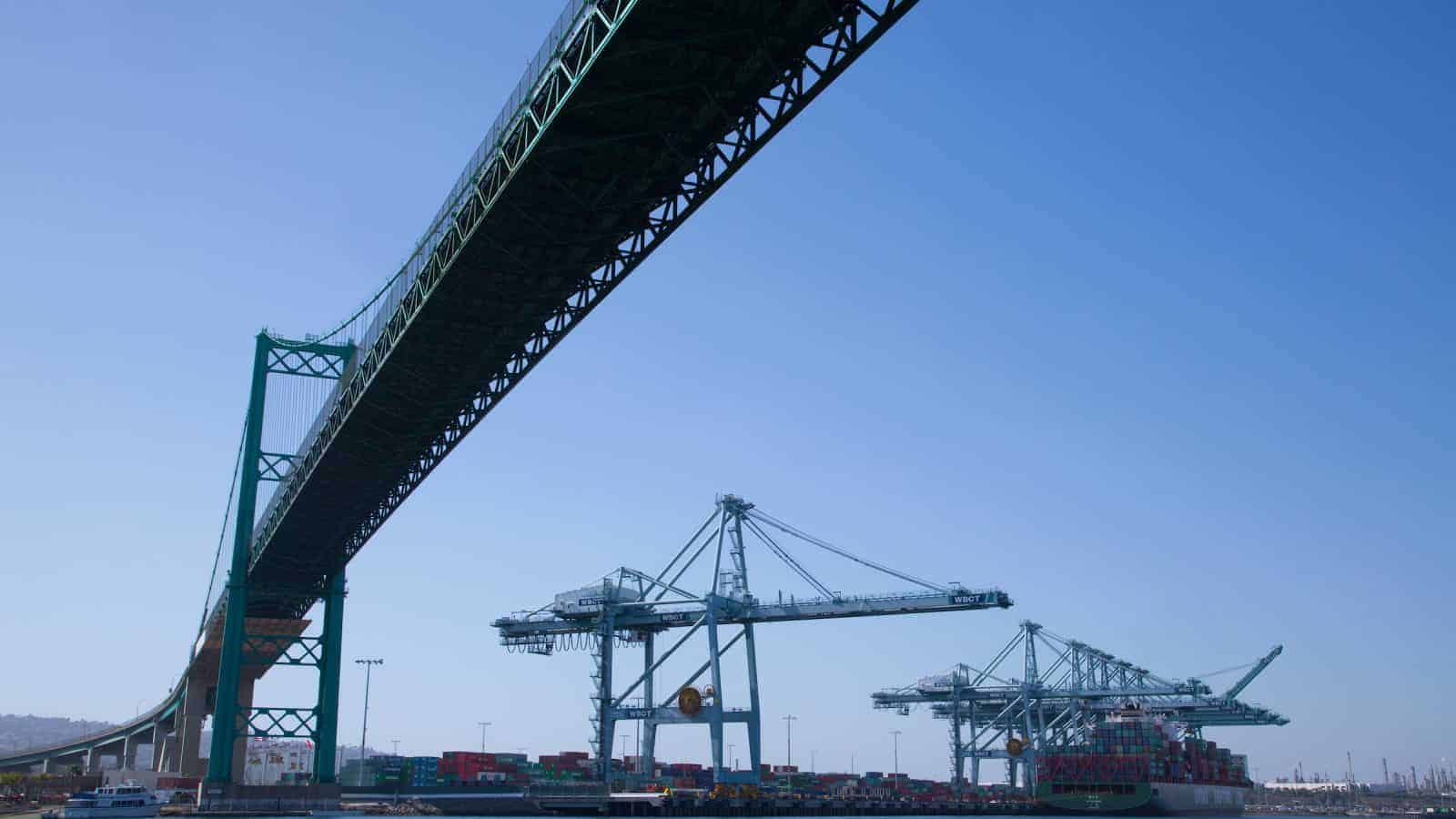Manufacturers Wake Up to Welcome News of Railway Agreement
Washington, D.C. – Following news of a tentative agreement between U.S. railroad companies and unions to avoid a strike, National Association of Manufacturers President and CEO Jay Timmons released the following statement:
“This morning’s announcement of a tentative agreement between the railroads and their workers is a welcome relief. Manufacturers had been putting into place contingency plans as they were facing disruptions with moving their supplies and products. Manufacturers thank President Biden, Secretary Walsh, Secretary Buttigieg and others in the administration who understood the stakes and stepped in to help prevent a very serious nightmare for the supply chain.”
-NAM-
The National Association of Manufacturers is the largest manufacturing association in the United States, representing small and large manufacturers in every industrial sector and in all 50 states. Manufacturing employs more than 12.8 million men and women, contributes $2.77 trillion to the U.S. economy annually and accounts for 58% of private-sector research and development. The NAM is the powerful voice of the manufacturing community and the leading advocate for a policy agenda that helps manufacturers compete in the global economy and create jobs across the United States. For more information about the NAM or to follow us on Twitter and Facebook, please visit www.nam.org.
Manufacturers Call for Quick Resolution to Rail Negotiations
Timmons: Delays in concluding the rail negotiations will exacerbate the pain of inflation and supply chain disruptions, and failing to reach an agreem
Washington, D.C. – Following news that White House aides and Cabinet officials spent Tuesday reviewing contingency plans for a work stoppage, including outreach to shippers, truckers and air-freight lines to keep goods moving, National Association of Manufacturers President and CEO Jay Timmons released the following statement on the ongoing negotiations between Class I railroads and labor unions representing the freight rail workforce:
“For years now, America’s manufacturing workers have endured the effects of rapidly rising material costs and severe supply chain disruptions, and our member surveys have shown quarter after quarter that these are among the top challenges affecting manufacturing growth in America. Further delays in concluding the rail negotiations will exacerbate the pain of inflation and supply chain disruptions, and failing to reach an agreement before Friday’s deadline would devastate the movement of manufactured products that families depend on,” said Timmons. “The Presidential Emergency Board has announced reasonable recommendations that nearly all parties have accepted, so now is the time to resolve remaining issues. We appreciate the administration’s proactive approach, and Congress should be ready to act as a last resort. But manufacturers still believe that the parties have it within their power to resolve these talks before they inflict severe economic damage.”
Currently, the American freight rail network accounts for nearly 40% of total freight volume, and a strike or delay in finalizing a long-term contract would have devastating impacts across surface supply chain networks and economic output. The Association of American Railroads recently released a report that found a nationwide freight rail interruption could cost more than $2 billion per day in lost economic activity.
Background: On Monday, Sept. 12, the NAM sent a letter to congressional leaders reiterating support for the work of the Presidential Emergency Board, which has aided in the talks. The NAM also urged Congress to use its statutory authority to institute the PEB’s recommendations should it become necessary to intervene. The NAM supported President Biden’s selection of an independent and objective PEB and believes that the recommendations announced on Aug. 16 have provided an appropriate framework to avoid disruption to freight rail operations.
-NAM-
The National Association of Manufacturers is the largest manufacturing association in the United States, representing small and large manufacturers in every industrial sector and in all 50 states. Manufacturing employs more than 12.8 million men and women, contributes $2.77 trillion to the U.S. economy annually and accounts for 58% of private-sector research and development. The NAM is the powerful voice of the manufacturing community and the leading advocate for a policy agenda that helps manufacturers compete in the global economy and create jobs across the United States. For more information about the NAM or to follow us on Twitter and Facebook, please visit www.nam.org.
From the Air Force to the Railroad: Tara Hogan’s Success Story

When Tara Hogan was growing up in Texas, she wanted to be a basketball coach—a career in freight rail wasn’t on her radar. But after high school and six years of service in the U.S. Air Force, she finished her college degree, took on a few different jobs and went looking for her next gig. She found Union Pacific Railroad on a list of companies looking to employ military veterans and landed a job as an operations management trainee in 2006.
More than 15 years later, after stints in Nebraska, Louisiana and Kansas, Hogan serves as a general manager at Union Pacific in Fort Worth, Texas, leading a team of 1,700 people as she runs the freight rail service in an active—and essential—area of the country.
Starting out: In many ways, Hogan found that her experience in the military gave her the tools to succeed at Union Pacific.
- “Union Pacific is a 24/7 operation that runs 365 days a year, as the military does,” said Hogan. “In the military, there’s a structure and a sense of certainty, and there’s comfort to that; at Union Pacific, there’s the same kind of certainty and structure. There’s a language in the military, and a language at Union Pacific.”
- “For me, it was the place I could go that felt the most familiar…. It’s got the structure of the military but the flexibility of the civilian environment.”
Paying it forward: Today, Hogan isn’t only an outstanding representative of the railroad industry in her own right; she’s also a role model for others who might be interested in a career in the sector—including individuals from communities that are currently underrepresented.
- Through Union Pacific’s UPLift program, which pairs underrepresented employees with executive sponsors, Hogan is sponsoring a woman in Fort Worth, offering career advice and networking support.
- “It’s not a one-and-done mentor situation,” said Hogan. “I’ll be with her throughout her career, and I’ll watch her grow. Hopefully, she’ll be my boss someday.”
A supportive environment: As a woman in freight rail, Hogan is generally in the minority, even as Union Pacific works to double the number of women employed at the railroad. Still, Hogan’s experience has been positive, and she has always felt encouraged to gain skills and rise in the company.
- “Everybody I have come across has wanted to see me succeed,” said Hogan. “If somebody is willing and wanting to learn, there are a ton of people here who want to teach you and see you be successful.”
- “I never thought I’d be in this position. I didn’t aspire to it. But the company saw something and kept challenging me to see what I can do. It’s been a great experience for me.”
The bigger picture: Hogan’s success at Union Pacific is part of the company’s ambitious efforts to advance women throughout its operations.
- Its Careers on Track program—in partnership with The Manufacturing Institute—aims to increase the number of women in the manufacturing and transportation, distribution and logistics industries.
- The program is designed to inspire women and youth to pursue modern industry careers through workforce development and career solutions.
The last word: “You can learn anything you want to learn here, depending on what your job is,” said Hogan. “Manufacturing has changed with the times and become better. All the opportunities to learn and grow have become better. If you’re a hard worker and willing to learn, there’s no glass ceiling anymore.”
Book Tax Would Disproportionately Burden Manufacturers

The proposed “book tax” in the Senate’s reconciliation bill “would overwhelmingly hit U.S. manufacturers,” according to a new analysis by the Joint Committee on Taxation, Congress’s non-partisan tax scorekeeper.
What’s going on: The reconciliation bill, the outline of which was released Wednesday by Senate Majority Leader Chuck Schumer (D-NY) and Sen. Joe Manchin (D-WVA), proposes a 15% minimum corporate levy, or “book tax,” on certain companies.
- The provision is estimated to raise $313 billion, and JCT finds that manufacturers would be responsible for paying nearly half of it.
What it means: The impact would be swift and devastating to manufacturers and the economy as a whole, said NAM Chief Economist Chad Moutray, who conducted his own analysis of the bill’s effects on the manufacturing sector.
Including direct, indirect and induced effects, in 2023 alone the impact would include:
- A real GDP reduction of $68.45 billion
- 218,108 fewer workers in the overall economy
- A labor-income decrease of $17.11 billion
Targeting manufacturers: “‘This is a domestic manufacturing tax, plain and simple,’” said Senate Finance Committee Ranking Member Mike Crapo (R-ID), who asked for the JCT analysis.
- “Despite Democrats’ claims, the book minimum tax does not close tax loopholes. Treatment of capital investments, like those made by American manufacturers, differ for book and tax purposes—for good reason,” according to a press release from Senate Finance Republicans.
- “Congress intentionally designed tax depreciation rules to support domestic investment. Democrats’ tax on U.S. manufacturing would eliminate that benefit.”
Exclusive: Sinema Meets with Manufacturers in Arizona, Talks Policy with the NAM
U.S. Senator Kyrsten Sinema (D-AZ) recently got an in-person look at manufacturing’s success in Arizona on a NAM-arranged tour of Phoenix manufacturer Valley Forge & Bolt. During her visit, which also featured a roundtable with manufacturers from across Arizona, she spoke with the NAM about the successful passage of historic infrastructure legislation without tax increases, the necessity of boosting semiconductor production and more.
- During the roundtable, Valley Forge & Bolt President and CEO Michele Clarke highlighted the direct impact of the 2017 tax reforms on her ability to invest in her facility and workforce. She thanked the senator for standing against future tax increases on manufacturers and for her leadership on infrastructure investment.
The NAM caught up with the senator after the roundtable for an exclusive interview. Here is some of what she said.
Infrastructure in Arizona: “We’ve got over $5.3 billion coming just to improve our roads and bridges in Arizona,” said Sinema. “That’s critical for the work we’re doing to shorten the supply chain. The benefits of this law will be seen for years to come.”
- “It provides a real opportunity for manufacturing businesses in Arizona to be able to utilize this energy and these dollars we’ve created to move forward, attract more companies to Arizona, and become a world leader in manufacturing.”
What’s next? “My number one goal now that this [infrastructure] bill has become law is to make sure that it’s implemented quickly, swiftly, and without bureaucracy,” said Sinema.
- “I want to make sure Arizona is getting its fair share of dollars so that the men and women who are running and working for our manufacturing companies can put these dollars to good use and make sure Arizona retains and grows its status as a domestic manufacturer.”
Creators Wanted: “There’s a need for us to really focus on investment in our education system so that we’re training the highly qualified tradesmen and tradeswomen who can do the work of this domestic manufacturing,” said Sinema. “That’s an area where we have an opportunity to grow, not just here in Arizona but across our nation. To meet this need so we can retain our global independence and competitiveness.”
Chips: “Arizona is already a hub for the microchip and the semiconductor industry; but passing the CHIPS Plus legislation will allow us to triple or even quadruple that investment,” said Sinema. “It’s incredibly important for us—not just for the tax credit and the investment in R&D—but for the tech hubs, for the investment in science, and to help attract more companies to build semiconductors right here in Arizona.”
The last word: “Manufacturing is the bread and butter of our state,” said Sinema. “It ensures that Arizona is a hub to the nation and the entire world in making products that will power our economy for the future.”
Read more: Check out the local coverage of the senator’s visit from the Daily Independent and the Phoenix Business Journal (subscription).
Manufacturers: Legislation Is a Bold, Important Step Toward Ramping Up the Domestic Manufacturing of Essential Inputs
Timmons: Every manufacturer will benefit. But there is more to be done.
Washington, D.C. – Following the House’s passage of the CHIPS-Plus Act, National Association of Manufacturers President and CEO Jay Timmons released the following statement:
“This legislation is a bold, important step toward ramping up the domestic manufacturing of essential inputs used by virtually every part of our industry. Every vote for the CHIPS-Plus Act was a vote for a more competitive manufacturing industry in America. This bipartisan legislation shows that Congress is taking the problems of supply chain disruptions and inflation seriously. Every manufacturer will benefit. But there is more to be done.
“Once President Biden signs it into law, manufacturers will work with lawmakers to build on the momentum and continue our advocacy for important measures that did not make it into the final CHIPS-Plus legislation, including trade measures, anti-counterfeiting protections and other workforce development priorities.
“But if lawmakers are truly serious about competing with China, they will now oppose the tax increases and attacks on pharmaceutical innovation in the latest reconciliation bill proposal, which will certainly lead to continued inflationary pressures. Congress should stay focused on bipartisan solutions, not legislation that weakens our economy and makes us less competitive with other countries.”
-NAM-
The National Association of Manufacturers is the largest manufacturing association in the United States, representing small and large manufacturers in every industrial sector and in all 50 states. Manufacturing employs more than 12.8 million men and women, contributes $2.77 trillion to the U.S. economy annually and accounts for 58% of private-sector research and development. The NAM is the powerful voice of the manufacturing community and the leading advocate for a policy agenda that helps manufacturers compete in the global economy and create jobs across the United States. For more information about the NAM or to follow us on Twitter and Facebook, please visit www.nam.org
New Study: Ports Stoppage Would Be Devastating Hit to Manufacturers’ Competitiveness
Cost Economy Half a Billion Dollars a Day, Destroy 41,000 U.S. Jobs
Washington, D.C. – As negotiations between the Pacific Maritime Association and International Longshore and Warehouse Union near a critical deadline, manufacturers are sounding the alarm about potential economic consequences of a port stoppage if disruption were to occur over two weeks at the ports of Los Angeles and Long Beach, the nation’s largest port complex. According to a study by Inforum Economics, a 15-day disruption would cost the U.S. economy nearly half a billion dollars a day—for a total of $7.5 billion—and destroy 41,000 jobs, including more than 6,100 in manufacturing.
As the industry continues to grapple with historic supply chain challenges, inflationary pressures and rising transportation and energy costs, manufacturers are calling on the parties to reach an agreement immediately to avoid this continued uncertainty.
“The ports of Los Angeles and Long Beach support a major share of cargo relied upon by American businesses and consumers, supporting supply chains across the entire country. With supply chains already stretched thin, inflation at its highest level in four decades and concerns of a recession rising, any disruption would mean a devastating hit to our economy and to manufacturers’ competitiveness,” said National Association of Manufacturers President and CEO Jay Timmons. “The disruption would be felt immediately. Manufacturing jobs will be lost if parts and supplies don’t arrive. New equipment, machinery and products can’t be built when ships are backed up and there is no one available to unload and process cargo. Our overseas customers won’t wait for us to fix these disruptions, either—they’ll simply find other suppliers, weakening U.S. manufacturing competitiveness in the process.
“This is why the Pacific Maritime Association and the International Longshore and Warehouse Union must not allow a disruption at these ports. Manufacturers, our millions of employees and the countless others whose lives and livelihoods depend on the products we make are counting on the PMA and the ILWU to reach a resolution and keep the ports running.”
Background: At the time of publication, the PMA and ILWU are engaged in labor negotiations. The NAM commissioned an analysis using the Inforum LIFT economic model to quantify the impacts of a 15-day closure at the Los Angeles and Long Beach ports. Specifically, it estimates how such a closure would impact U.S. employment, output and income. These ports have experienced historic disruptions and bottlenecks since late 2020, and nearly 84% of manufacturers now list freight and transportation costs as a key driver of inflation.
-NAM-
The National Association of Manufacturers is the largest manufacturing association in the United States, representing small and large manufacturers in every industrial sector and in all 50 states. Manufacturing employs more than 12.7 million men and women, contributes $2.71 trillion to the U.S. economy annually and accounts for 58% of private-sector research and development. The NAM is the powerful voice of the manufacturing community and the leading advocate for a policy agenda that helps manufacturers compete in the global economy and create jobs across the United States. For more information about the NAM or to follow us on Twitter and Facebook, please visit www.nam.org.
Manufacturers Launch Ad Campaign to Protect Manufacturing Competitiveness
Tax Increases Do Nothing to Reduce Energy Costs, Address Supply Chain and Inflation Challenges
Washington, D.C. – Amid historic supply chain challenges and inflationary pressures, along with increasing energy costs, the National Association of Manufacturers is launching a six-figure ad campaign calling on Congress to protect manufacturing jobs by opposing new taxes on the industry, including those meant to punish the very energy manufacturers that are being asked to produce more. The print, radio and digital ads will run in Washington, D.C., and in key states across the country.
“Manufacturers have kept our promises—especially after the 2017 tax reforms—to create jobs, raise wages and benefits and invest in our communities. To keep up this winning record, we need Congress to enact policies consistent with our manufacturing competitiveness agenda. That’s how we’ll strengthen supply chains, expand access to affordable, reliable energy and tamp down inflation. Our industry is ready to keep solving problems and create well-paying jobs—but returning to outdated tax policies will impede our progress,” said NAM President and CEO Jay Timmons.
Background on manufacturing growth following the enactment of tax reform in 2017:
- In 2018, manufacturers added 260,000 new jobs. That was the best year for job creation in manufacturing in 21 years.
- In 2018, manufacturing wages increased 3.1% and continued going up—by 2.9% in 2019 and 3.0% in 2020. Those were the fastest rates of annual growth since 2003.
- Manufacturing capital spending grew 4.5% and 5.7% in 2018 and 2019, respectively.
- Overall, manufacturing production grew 3.2% in 2018, the best since 2010.
The NAM has published research on the impact of rolling back tax reform (study available here and click here for a summary of the study’s findings) and increasing the U.S. Global Intangible Low-Taxed Income (GILTI) tax burden (study available here).
-NAM-
The National Association of Manufacturers is the largest manufacturing association in the United States, representing small and large manufacturers in every industrial sector and in all 50 states. Manufacturing employs more than 12.7 million men and women, contributes $2.71 trillion to the U.S. economy annually and accounts for 58% of private-sector research and development. The NAM is the powerful voice of the manufacturing community and the leading advocate for a policy agenda that helps manufacturers compete in the global economy and create jobs across the United States. For more information about the NAM or to follow us on Twitter and Facebook, please visit www.nam.org.
The NAM Calls on Congress to Help on Energy, Climate

The U.S. needs a unified climate-change strategy that will strengthen our energy security while empowering manufacturers, the NAM told the House of Representatives’ Energy, Climate and Conservation Task Force this week.
What’s happening: The Republican task force is one of seven recently created by House Minority Leader Kevin McCarthy (R-CA) to enact targeted policy solutions to current challenges and guard against future crises.
- Among these are rising energy prices, supply chain instability and a lack of critical minerals—all dilemmas that can be fixed through sound policy, NAM Vice President of Energy and Resources Policy Rachel Jones told the task force.
What can be done: “We welcome the ECC Task Force’s proposals that will address current challenges, including increasing domestic energy production; stabilizing and securing supply chains—particularly domestic production and processing of critical materials, minerals and chemicals; permitting reform that provides regulatory certainty for the development and deployment of projects; and innovation policies that incentivize an all-of-the-above energy approach rather than picking winners and losers,” Jones said.
Why it matters: Jones urged task force members to seek solutions found in the NAM’s comprehensive climate blueprint, The Promise Ahead, as well as its supply chain recommendations and energy and environmental policy agendas.
- Jones stressed the need for a unified domestic and global approach to tackling climate change while strengthening U.S. energy security.
Manufacturers matter: Jones also hammered home the importance of including manufacturers in the conversation about climate and energy fixes.
“An agenda for the future must recognize manufacturers as the solution to emerging environmental challenges and build on the strong steps manufacturers have already taken to become more sustainable and tackle climate change; apply sound science and evidence-based approaches in new proposals; and appropriately balance the United States’ economic and environmental interests so that achieving one goal does not mean ignoring the other.”
NAM to Congress: It’s Time to Act on China

We can ensure that this is the “American century” that brings success to manufacturers and citizens alike—but only through swift action to fix our relationship with China and ensure that our manufacturers can compete on a level playing field—the NAM recently told members of the House of Representatives’ China Accountability Task Force.
What’s going on: To strengthen national security and our global competitiveness, we need a new approach to China, NAM Vice President of International Economic Affairs Ken Monahan told key Republican leaders of the task force.
- The task force, established by House Republican Leader Kevin McCarthy (R- CA) and run by the lead Republican on the House Committee on Foreign Affairs, Rep. Michael McCaul (R-TX), includes 18 leading Republican members focused on tackling broad issues related to China.
The recommendations: According to Monahan, the U.S. approach should include:
- A “national strategic vision [for] and bold investments” in domestic manufacturing;
- Sound engagement with allies, particularly in the Indo-Pacific region;
- “Assertive global leadership to ensure that the U.S.—not China—is writing the rules for the international system, including issues such as trade and climate”;
- Consistent pressure applied directly and with allies to ensure China meets its trade and economic commitments;
- Strategic use of “enforcement tools to target … areas of problematic Chinese trade behavior”;
- Expanded efforts to combat Chinese intellectual property theft;
- Targeted upgrades to national security frameworks; and
- Stronger collaboration between manufacturers in the United States, Congress and the executive branch “to advance American values abroad.”
Why it’s important: Without such moves, troubling actions by China would likely only increase.
- “For manufacturers, China has long been a hub for unfair industrial subsidies and government-fueled overcapacity in areas like steel and aluminum that distort global markets,” Monahan said.
- “China continues to promote discriminatory industrial policies, forced technology transfer and intellectual property theft that harm manufacturers and workers in the U.S. Increasingly, China is also using global institutions and its economic influence to build alliances that challenge American interests, human rights and democratic values.”
NAM leadership: The NAM has called on political leaders of both parties, in the administration and on Capitol Hill, to develop and implement a clear, robust strategy to tackle China built on these core principles. NAM President and CEO Jay Timmons urged President Biden in March 2021 to take such action, repeating the call to senior administration officials in August 2021.
